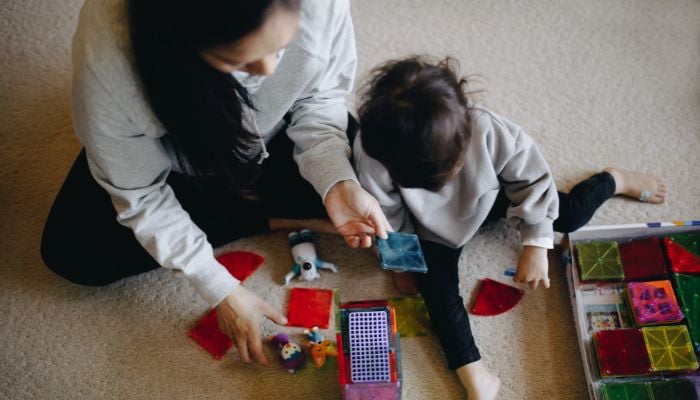'I'm struggling to discipline my toddler in public settings. Please help!'
"I neither want to be known as a mother who can't discipline her kid nor someone who can't stand up for her child," says a toddler mom
May 14, 2025
Hello Haya,
I'm a young mother of a two-year-old boy who is a very energetic kid. Now my problem is that ever since my son began walking he just doesn't sit anywhere — whether we're at home or elsewhere. While we're okay with him being his mischievous and energetic self at home because this is a part of his growing up phase, but it gets really difficult for us to manage him when we are going out for dinner or visiting relatives or friends.
We recently went to my husband's aunt's home for a get-together and he just wouldn't sit at one place and almost broke something. As a mother, I try my best to discipline my son, but he's a toddler at the end of the day. My husband's aunt was visibly furious and even once told off my son. This made feel really awkward but also slightly angry because how can people expect a little child to be completely obedient.
This instance left me really embarrassed but I also feel that people need to be a little understanding. I just didn't know how to react in that very moment. But I really want to understand how to manage such situations in the future. I neither want to be known as a mother who can't discipline her kid nor someone who can't stand up for her child. Please help!
— A struggling mother

Dear struggling mother,
Thank you for sharing a very relatable query. I am sure a lot of mothers can relate to it.
First and foremost, I want to acknowledge something that often goes unseen — that you are trying. You're showing up, you're reflecting, and you're clearly a loving and thoughtful parent.
When it comes to your query, I’m hearing that your son’s behaviour outside the home is leaving you feeling embarrassed and overwhelmed, especially during visits to friends, family, or when you're out for dinner. As you mentioned, he’s a toddler, full of energy and curiosity, for which his behaviour is completely normal at this stage.
But I also hear that it’s not just about his behaviour — it’s the pressure of how you're perceived while you parent in public. Trying to strike that balance between “firm discipline” and “warm defence” can be overwhelming, especially when there are eyes watching, judgments forming, and cultural expectations quietly (or not-so-quietly) pressing in.
There are a few ways to handle this situation, lets explore and take what fits you best:
1. Manage your expectations
Two-year-olds are wired for movement, curiosity, and impulse. They don’t yet have the neurological capacity to “sit still” for long or understand social expectations the way adults do. What feels like defiance is often just a mismatch between a child’s developmental stage and the adult environment they’re placed in especially in unfamiliar environments. You would need to expect him to behave in a manner any two-year-old would.
2. Prepare before hand
- Before you go for social outings, take familiar toys, activities to keep him engaged. Prepare him before hand, for example by saying (We’re going to aunty’s house. There will be breakable things. We’ll stay in one room/play with quiet toys). Even toddlers benefit from gentle, age-appropriate reminders.
- If you feel the event is not child friendly, then sometimes either you or your husband could go or you can briefly attend or you could ask someone to babysit for you.
3. Set boundaries gently during the visit
- If your child is being particularly active, try calmly guiding them. For example, “Let’s sit together for a while” or “lets go see this corner of the room”
- If they’re about to break something, redirect without scolding: “Oops, that’s not for playing. Let’s find your toy.”
- Give the guests a heads up and let them know he’s super restless and energetic and doesn’t sit still in this phase – that way you’ve managed expectations beforehand.
4. Stand up for your child
If someone says something to your son and you don’t like it, you can respectfully set a boundary. Stay calm yet protective. For example: “He’s in his terrible two’s and he’s super restless as all kids his age and is still learning. We are working on it, I'll handle it, thank you". Or if you freeze in the moment you can follow up later and say, "Hey, thanks for having us over. I know (xyz) can be mischievous, and can be overwhelming for everyone, we are already working on disciplining him as he grows older.
5. Choose where you would like to go
If you feel uncomfortable going out at this stage, you can respectfully decline the places you feel like there is lack of understanding for his behaviour and choose to go to the places where you feel more ease and comfort.
6. You’re not failing to discipline
It can be really easy to be hard on yourself but remember you are parenting in reality. You’re not raising a robot — you’re raising a person. A curious, emotionally developing little boy who will benefit far more from your patient guidance than from forced obedience. You are not failing by feeling embarrassed — it’s a natural human response.
Last but not least, remember, there's no such thing as a perfect parent.
Give yourself some credit and compassion — you're doing the best you can. Parenting is a balancing act between advocating for your child and respecting the space of others. What truly matters is not perfection, but intention — and you're showing a great deal of heart and awareness in wanting to learn from this.
Good luck and best wishes,
— Haya

Haya Malik is a psychotherapist, Neuro-Linguistic Programming (NLP) practitioner, corporate well-being strategist and trainer with expertise in creating organisational cultures focused on well-being and raising awareness around mental health.
Send her your questions to [email protected]
Note: The advice and opinions above are those of the author and specific to the query. We strongly recommend our readers consult relevant experts or professionals for personalised advice and solutions. The author and Geo.tv do not assume any responsibility for the consequences of actions taken based on the information provided herein. All published pieces are subject to editing to enhance grammar and clarity.













